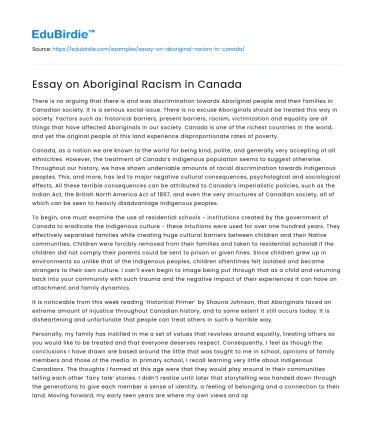There is no arguing that there is and was discrimination towards Aboriginal people and their families in Canadian society. It is a serious social issue. There is no excuse Aboriginals should be treated this way in society. Factors such as: historical barriers, present barriers, racism, victimization and equality are all things that have affected Aboriginals in our society. Canada is one of the richest countries in the world, and yet the original people of this land experience disproportionate rates of poverty.
Canada, as a nation we are known to the world for being kind, polite, and generally very accepting of all ethnicities. However, the treatment of Canada’s Indigenous population seems to suggest otherwise. Throughout our history, we have shown undeniable amounts of racial discrimination towards Indigenous peoples. This, and more, has led to major negative cultural consequences, psychological and sociological effects. All these terrible consequences can be attributed to Canada’s imperialistic policies, such as the Indian Act, the British North America Act of 1867, and even the very structures of Canadian society, all of which can be seen to heavily disadvantage Indigenous peoples.
Save your time!
We can take care of your essay
- Proper editing and formatting
- Free revision, title page, and bibliography
- Flexible prices and money-back guarantee
To begin, one must examine the use of residential schools - institutions created by the government of Canada to eradicate the Indigenous culture - these intuitions were used for over one hundred years. They effectively separated families while creating huge cultural barriers between children and their Native communities. Children were forcibly removed from their families and taken to residential schools; if the children did not comply their parents could be sent to prison or given fines. Since children grew up in environments so unlike that of the Indigenous peoples, children oftentimes felt isolated and became strangers to their own culture. I can’t even begin to image being put through that as a child and returning back into your community with such trauma and the negative impact of their experiences it can have on attachment and family dynamics.
It is noticeable from this week reading ‘Historical Primer’ by Shauna Johnson, that Aboriginals faced an extreme amount of injustice throughout Canadian history, and to some extent it still occurs today. It is disheartening and unfortunate that people can treat others in such a horrible way.
Personally, my family has instilled in me a set of values that revolves around equality, treating others as you would like to be treated and that everyone deserves respect. Consequently, I feel as though the conclusions I have drawn are based around the little that was taught to me in school, opinions of family members and those of the media. In primary school, I recall learning very little about Indigenous Canadians. The thoughts I formed at this age were that they would play around in their communities telling each other ‘fairy tale’ stories. I didn’t realize until later that storytelling was handed down through the generations to give each member a sense of identity, a feeling of belonging and a connection to their land. Moving forward, my early teen years are where my own views and opinions were most severely impacted by those around me. With all the stereotypes surrounding the Indigenous as ‘drunken and homeless Aborigines’ and all they do is get intoxicated. In high school, the only thing I was taught about the Indigenous people was the history of residential schools which involved viewing a movie about it and a quick reflection… no real learning. This goes to show that the education system and society has failed to bring the injustices Aboriginals face to the forefront. I believe becoming more educated on the history of the Indigenous would better instill knowledge about what they went through and result in less people discriminate them.
Aboriginal people have been treated poorly throughout Canadian history. From being discriminated against by the government and society. Being taken off their land and not being able to practice their religion and beliefs. Today, Aboriginals are still treated poorly. There are many issues like poverty, low education rate, social issues, poor housing and many more. To help Aboriginal people deal with racial discrimination, people can become familiar with legislatures like: the Canadian Charter of Rights and Freedoms, the Canadian Human Rights Act, the Employment Equity Act, just to name a few. Also, to help Aboriginal people overcome racism and stereotyping they can: find a strong sense of community among other Aboriginal people and non-Aboriginal people, educate others about racism by getting rid of myths and false images, focus on facts and details, etc.
Finally, it can also be concluded that Canada’s treatment of Indigenous peoples has been horrid for far too long, from the residential schools and abuse lasted for over one hundred years to the systemic racial discrimination of the 21st century in which so many of the structures that hold our society together have been built to disadvantage those who need it the most. Although we as a nation have undoubtedly changed since the closing of the last residential school, it is evident there is still much more to be done.






 Stuck on your essay?
Stuck on your essay?

